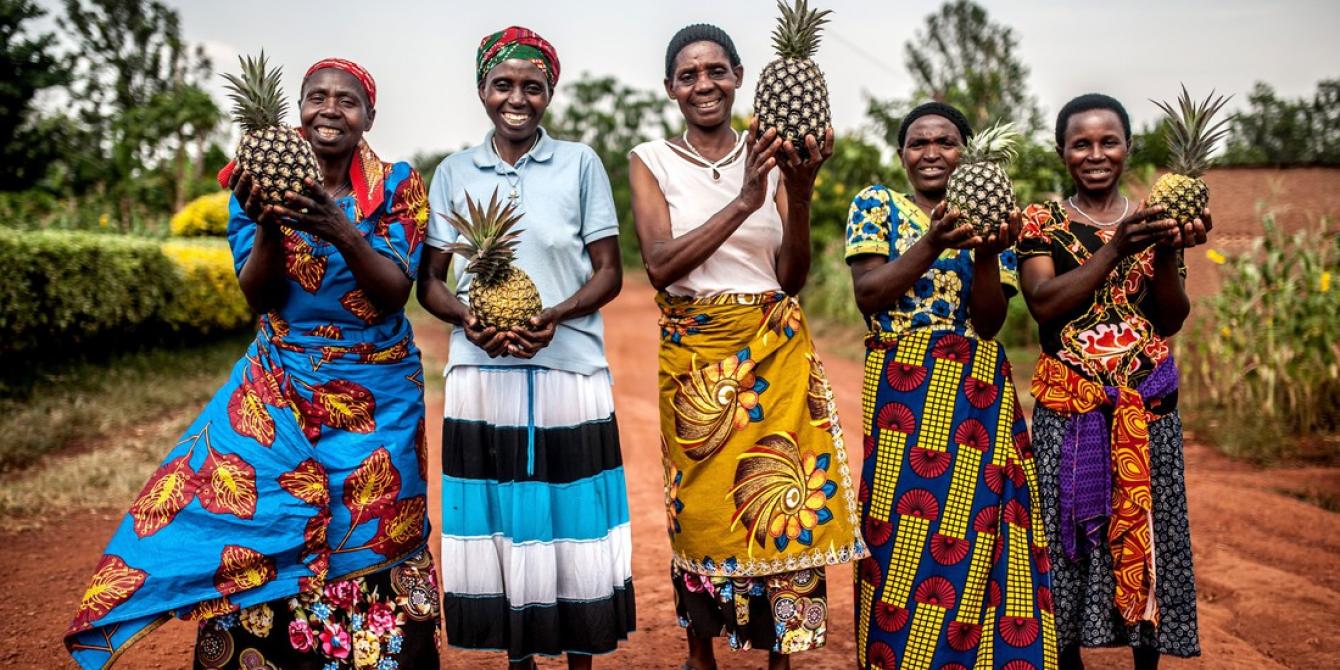
Tuzamurane cooperative members stand outside the cooperative centre in Eastern Rwanda, Kirehe District. From left to right: Theresie Nyirantozi, Valerie Mukangerero, Christine Bangiwiha, Josepha Ayinkamiye, Mukeshimana Leocadie. Photo by Aurelie Marrier d'Unienville / Oxfam.
The economic impact of coronavirus in Rwanda: Insights from Oxfam supported Small and Medium Enterprises (SMEs)
The COVID-19 pandemic characterized by airports and border closures as well as lockdowns, has already become an economic and labour market shock, impacting not only supply but also demand. In Rwanda, the implementation of lockdown measures has placed a major distress on the country’s food value-chains, particularly businesses in the agricultural sector. Research done by Rwandese economists on the indicative socio-economic impacts of COVID-19 on Rwanda predicts that, despite the measures taken by the government to curb the spread of the virus and the discipline of Rwandan citizens, the agriculture sector and international trade will be negatively affected. SMEs are expected to be even more affected, yet they are a main source of livelihoods for most Rwandans.
In Rwanda, SMEs accounts for 41% of all private sector employment. SMEs are about 98% of all enterprises and provide 84% of private employment. With their significant contribution to the economy, the Gross Domestic Product (GDP) will be affected too. The International Monetary Fund (IMF) projection of the annual GDP for Rwanda shows that a change of around 3.5% will occur in 2020 and 6.7% in 2021. The measures taken by the government to contain the spread of the pandemic such as restriction of unnecessary movements, ban of some businesses, and ban of travel between different cities in the country have created a huge impact on SMEs that are supported by Oxfam in Rwanda.
Nyiranziza Donatha and another Tuzamurane cooperative member load their pinapples onto the Tuzamurane cooperative delivery truck before COVID-19 travel restrictions took effect. Photo by Aurelie Marrier d'Unienville / Oxfam.Recently, Oxfam in Rwanda conducted a rapid survey on the economic impacts of COVID-19 on SMEs that we support. The purpose of the survey was to generate information to inform strategies for response during the COVID-19 lockdown period. The preliminary results show that, among the impacts faced by these SMEs, the labour related impacts and disrupted domestic supply, as well as access to market, emerged as major causes that led companies to take some operational measures that have impacted livelihoods.
Muhanga Food Processing Industries (MFPI) is one of the main processors of soy-based products in the southern province of Rwanda. Their products include tofu, soy milk and soy flour. With Oxfam’s support, MFPI planned to increase annual sales of 150% between 2019 and 2020. With movement restrictions, physical distancing and total lockdown, MFPI could only operate at 25% of its normal production capacity. Their big market was schools which are now closed. Thus, the company has lost its major clients. They have been forced to reduce their human resources and can only fully employ 10 staff out of 35 contracted staff.
On the other hand, Tuzamurane is a cooperative of organic pineapple growers in Kirehe district, in eastern province of Rwanda. The cooperative dries pineapples and exports them to France. Tuzamurane also sells fresh pineapple to local and national markets. “Since the outbreak was confirmed in Rwanda, we have not been able to ship 6 Metric Tons of dried pineapple to our main client in France. We have been forced to hold on the product until further notice. Now, we do not have any other choice than reducing our staff. We will only remain with 3 staff out of 31 contracted staff,” says Jean Damascene Hakuzimana, the President of Tuzamurane Cooperative.
Pineapples are hollowed out for drying at the Tuzamurane pineapple cooperative processing plant in Eastern Rwanda, Kirehe District. Photo by Aurelie Marrier d'Unienville / Oxfam.
On May 1, Rwanda announced new measures easing the nationwide lockdown to revive the country’s economy. The new measures have allowed public and private businesses to resume work with essential staff while other employees remain working from home. The markets are open for essential vendors not exceeding 50% of registered traders. Hotels and restaurants operate and close by 7 pm. Meetings and mass gatherings are strictly prohibited. Borders will remain closed except for cargo. Schools will remain closed until September 2020 as well as worship places, bars and recreation centres.
With the number of COVID-19 cases still increasing, the government of Rwanda will review new measures. Possibly, the pandemic will push many households into poverty and food insecurity because of job losses, trade disruption, a decrease in agricultural production as well as food imports. SMEs provide most of the private employment, small holder farmers depend on them for employment and on farm income, they are the main source of livelihoods. Since most of SMEs are hit hard by COVID-19 consequences, livelihoods will be negatively impacted by this outbreak as well.
When this crisis passes, SMEs will be expected to be ready and back to normal business. To help them recover, there will be a need to inject liquidity in the system including SMEs hit hard by the closure and disruption in supply chains. For instance, SMEs should be granted a certain period of loan freeze or be granted emergency loans to support them and flexibility for repayments of existing loans. The economic stimulus package to be announced by the government of Rwanda in response to minimise shocks from the pandemic, must consider the most vulnerable people including workers and small businesses whose livelihoods are disrupted and find it difficult to cope with the situation. If not so, it will take time before SMEs such as Muhanga Food Processing Industries and Tuzamurane cooperative recover fully from the economic shock.




 Follow us on Facebook
Follow us on Facebook Follow us on Twitter
Follow us on Twitter